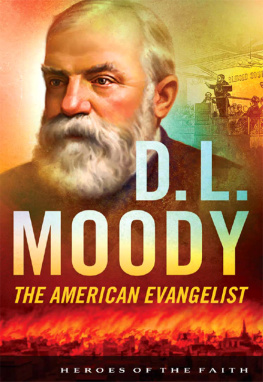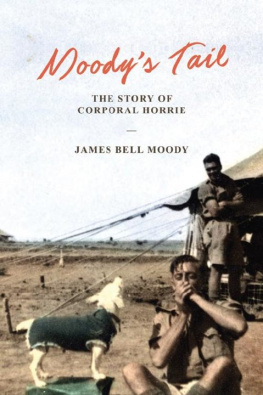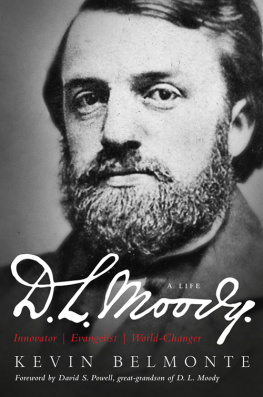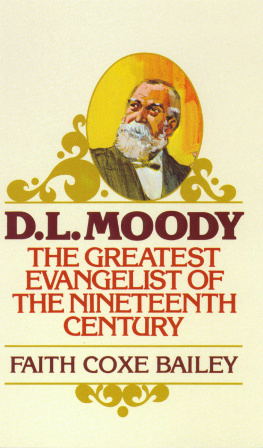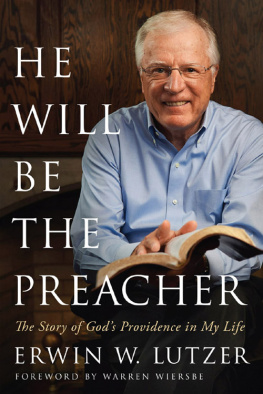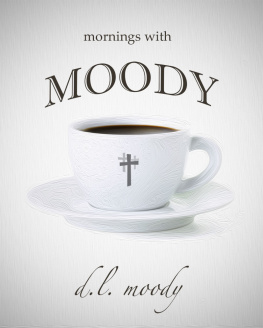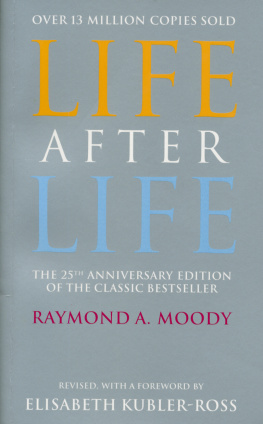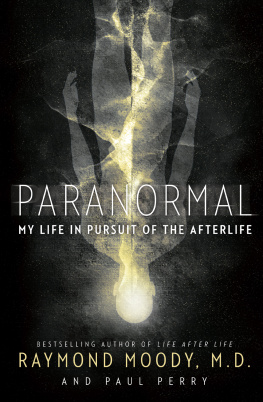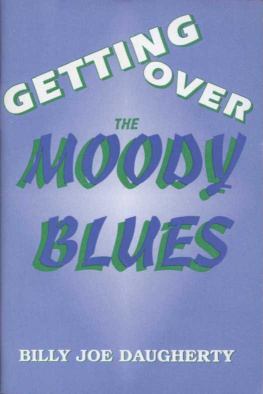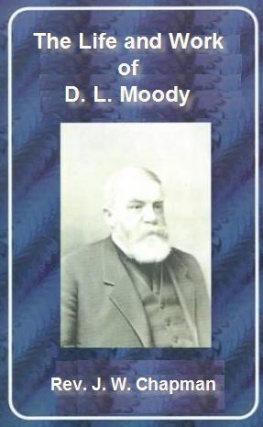
1997 by Barbour Publishing, Inc.
Print ISBN 978-1-62416-124-7
eBook Editions:
Adobe Digital Edition (.epub) 978-1-62416-425-5
Kindle and MobiPocket Edition (.prc) 978-1-62416-424-8
All rights reserved. No part of this publication may be reproduced or transmitted for commercial purposes, except for brief quotations in printed reviews, without written permission of the publisher.
Churches and other noncommercial interests may reproduce portions of this book without the express written permission of Barbour Publishing, provided that the text does not exceed 500 words and that the text is not material quoted from another publisher. When reproducing text from this book, include the following credit line: From D. L. Moody, published by Barbour Publishing, Inc. Used by permission.
All scripture quotations, unless otherwise noted, are taken from the King James Version of the Bible.
Cover illustration: Greg Copeland
Cover design: Kirk DouPonce
Published by Barbour Publishing, Inc., P.O. Box 719, Uhrichsville, Ohio 44683, www.barbourbooks.com
Our mission is to publish and distribute inspirational products offering exceptional value and biblical encouragement to the masses.

Printed in the United States of America.
To Rayposthumously:
With deep love and affection
for helping me to appreciate
D.L. Moody, his person, and his ministry.
1
OBSCURE BEGINNINGS
The world has yet to see what God will do with a man fully consecrated to Him, the English butcher and lay preacher Henry Varley observed to D. L. Moody as they left an all-night prayer meeting. His words stuck with Moody. Having traveled to Britain that summer of 1872, Moody was seeking rest and renewal. Varleys words gave him a new goal.
THE WORLD HAS YET TO SEE WHAT GOD WILL DO WITH A MAN FULLY CONSECRATED TO HIM.
A man! Moody wrote. Varley meant any man. Varley didnt say he had to be educated or brilliant, or anything else. Just a man. Well, by the Holy Spirit in me, Ill be that man.
Soon after Moody made that vow, a Congregational minister in London invited him to preach at Arundel Square in a lower-middle-class district. Visiting during the Sunday morning sermon, Moody was irritated at the congregations indifference. The people seemed to be lifeless and disinterested in anything the minister had to say. Moody was tempted not to preach that night and wondered what message he could possibly bring that would have meaning for such downcast people. What could he say that would have an impact on their lives?
But that evening as Moody brought the message, the entire atmosphere seemed charged with electricity, and the congregation listened attentively and in quietness. In closing, he urged any who wanted to have your lives changed by the power of God through faith in Jesus Christ as a personal Savior, who wanted to become Christians, to stand, so he could pray for them. People stood all over the chapel.
Astonished, Moody thought they had not understood and asked them to sit down. He stated again what becoming a Christian meant and then invited those who wished to do so to depart to an adjoining hall. He watched in amazement as scores of men, women, and older children made their way quietly to the connecting door. A schoolroom had been prepared for use as an inquiry room by setting out one or two dozen chairs. More chairs had to be added to seat the overflow crowd of people.
Addressing the crowd, Moody enlarged on repentance and faith, and again asked the people about becoming Christians. Once more, the whole room stood. In shock, Moody told them to meet with their minister the following night.
That Monday morning he left London for another part of England, but on Tuesday he received a telegram urging him to come back to the London church. More people had come to the ministers meeting on Monday night than had been in the room on Sunday!
Returning to London, Moody spoke at the Arundel Square Church each night for two weeks. Some fifty-three years later, Baptist minister James Sprunt recalled that the results were staggering: Four hundred were taken into membership of that church, and by the grace of God I was one of that number.
Who was this rough, blustery, uneducated American? What brought him to London at such a time? What credentials did he possess that qualified him to preach to the dignified, reserved English? What message could he bring that they had not already heard?
Dwight Lyman Ryther Moody, born February 5, 1837, grew up in the gentle hill country of Northfield, Massachusetts. From birth, Dwight possessed a rugged constitution and determination to match. His happy-go-lucky father, Edwin, celebrated his sons birth with friends at the local pub.
A stonemason by trade, Edwin enjoyed drinking as well as the social life at the pub.
HE INVITED EVERYONE TO CELEBRATE DWIGHTS BIRTH WITH HIM: CMON, EVERYONE. HAVE A GLASS OF ALE ON ME!
He invited everyone to celebrate Dwights birth with him: Cmon, everyone. Have a glass of ale on me! he bellowed. Of course, the pub patrons were only too happy to oblige. The people of Northfield liked Edwin: he was pleasant, hardworking, and easy to get along with. Because he disliked offending people, however, he often shrank from collecting debts owed to him. This trait made paying his own bills more difficult. One more mouth to feed scarcely bothered Edwin. He enjoyed life and his family too much to give it a second thought.
The Ryther part of Dwights name was dropped when the village doctor, Gideon Ryther, for whom he was named, failed to give the Moodys the expected sheepthe acceptable offering for being someones namesake. The little boy became known simply as Dwight Lyman Moody.
The small town of Northfield, Massachusetts, was located on both sides of the Connecticut River near the New Hampshire and Vermont borders and had a population of nearly seventeen hundred. During its early years, Northfield was known as Squakeag, an Indian name meaning salmon. The settlements strategic location provided a primitive outpost to ward off French and Indian attacks.
The Moodys and Holtons, Dwights ancestors, appear in Northfields records nearly from the beginning. The Holtons settled in Northfield by 1672. Isaiah Moody, Dwights grandfather, moved to Northfield in 1796 in order to practice his brick masonry trade; and Edwin, his first son, was born in 1800.
The two families were united when Dwights parents were married on January 3, 1828; Betsey Holton was twenty-three, Edwin Moody, twenty-eight. The wedding had been scheduled for New Years Day, but the Connecticut River unexpectedly thawed and overflowed its banks, so Edwin could not get to the wedding that day. But Edwin, despite this turn of events, detoured many miles, and two days later, married Betsey.
The young couple moved into an unpainted colonial house built by Edwins cousin, Simeon Moody. Built at the north edge of town, the house lay at the base of a small, bald knoll in a treeless pasture and looked out over the Connecticut River.
The Moodys shared with their Northfield neighbors a quiet trust in God. After all, Northfield Unitarian Church, even though cold and austere, was considered the center of the community, and membership was assumed for all proper citizens.
But Dwights mother, Betsey, tall and stately, was really the strong spiritual force in the familys life. As her family began to grow, she taught her children a little Bible lesson every day, and on Sundays she accompanied them to the Unitarian Sunday school. Betsey made all her boys swear vengeance on whiskey and everything that was an enemy to the family.

